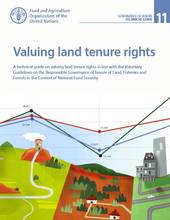Valuation and taxation
 The valuation of tenure rights is required for many purposes. Buyers and sellers who enter into transactions in the market need to know the value of what is being traded.
The valuation of tenure rights is required for many purposes. Buyers and sellers who enter into transactions in the market need to know the value of what is being traded.
Fair valuations are becoming increasingly important as people seek to make investments on natural resources to which communities hold legitimate tenure rights. Land, fisheries and forests taken by the State for public purposes through expropriation also require fair valuation in order for the payment of prompt compensation.
Taxation related to tenure rights is an important source of revenue for central and local governments, and such taxes should be based on appropriate values. The Voluntary Guidelines calls for the development of appropriate systems of valuation and for taxation. (See section 18 on Valuation and section 19 on Taxation).
Case study
 Namibia introduced a land tax on commercial farmland to support the implementation of the 1995 Agricultural (Commercial) Land Reform Act that was passed after an inclusive, participatory and consultative National Land Conference.
Namibia introduced a land tax on commercial farmland to support the implementation of the 1995 Agricultural (Commercial) Land Reform Act that was passed after an inclusive, participatory and consultative National Land Conference.
The taxation of farmland is intended to encourage efficient use of commercial agricultural land, discourage non-productive land holdings and multiple ownership of farms, encourage redistribution/diversification of ownership and reduce land prices. This broadens access to ownership and address poverty reduction through resettlement of poor families. To ensure an efficient and effective land taxation system, the Government of Namibia established a Directorate of Valuation and Estate Management with a mandate to advise on the valuation of property and to lead the implementation of a tax on commercial farmland.
The Government worked with academic institutions to develop the capacity to improve the competencies of staff involved in valuation, administration of land tax, land surveying, land registration and land use planning. Read about this and more in our latest publication on Valuing land tenure rights.
